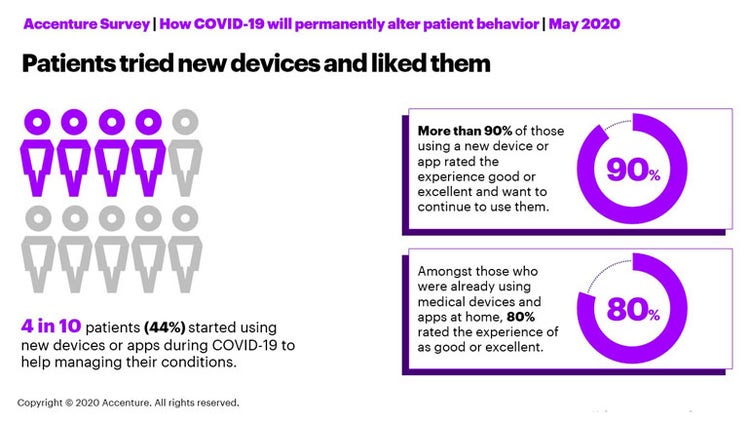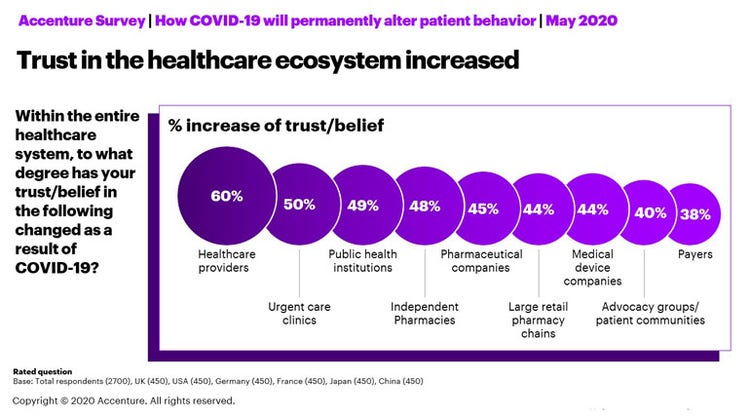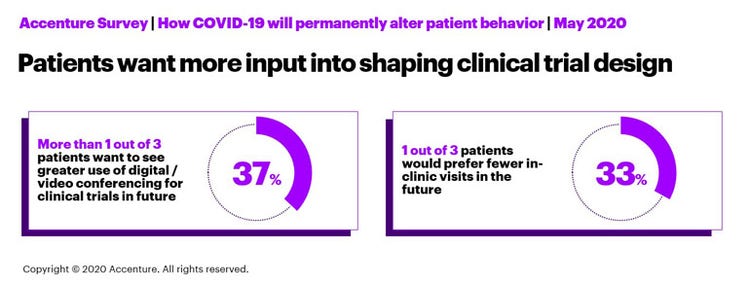July 09, 2020
Patients Want to Continue to Use Virtual Care Even After the Pandemic Ends, Accenture Survey Finds
Nine out of 10 reported the quality of care was as good or better than before
NEW YORK; July 9, 2020 – Patients have embraced virtual care and communications at very high rates as a result of COVID-19 and nine out of 10 reported the quality of care was as good or better than before, according to findings of an Accenture (NYSE: ACN) survey of 2,700 oncology, cardiology, or immunology patients globally.
Sixty percent said that based on their experience during the pandemic, they want to use technology more for communicating with healthcare providers and managing their conditions in the future.
The survey was conducted in May across China, France, Germany, Japan, the U.K. and the U.S. at a time when all participating countries were under some degree of government restrictions as a result of the global pandemic.
As restrictions came into effect, patients faced difficult choices about whether and how to continue their treatments. Many healthcare providers cancelled appointments, and transportation options were shut down. Patients were afraid to risk exposure to COVID-19 by going to their healthcare providers for regular treatment, and many (70%) deferred or cancelled at least some elements of their treatment.
But nearly half of all surveyed patients also started getting some treatment at home instead of going to their healthcare provider’s office and they began using virtual tools such as video conference calls, online chat, and apps. Sixty-three percent of those who used video conferencing said it was very good or excellent, an impressive response given 70% were using video conferencing for treatment for the first time. By using technology to support communication and care, healthcare providers were largely able to maintain or even improve on the patient experience.

“Along with the move to virtual forms of care and communication came a sense of greater satisfaction with the care provided,” explained Brad Michel, Accenture North America Life Sciences lead. “Many patients said they felt care was more personal, more convenient and timelier. Rather than having to commute to a doctor’s office or treatment facility and undergo the stress of sitting in a waiting room for their turn, care was now being administered at home — in a setting, time and place where people felt most comfortable. A good many also said the information they received was better.”
Forty-seven percent of respondents said they received better, more personalized responses; 41% said quicker responses and 40% said it was more convenient to access through new communications channels.
In addition, overall trust in the healthcare system has increased. Sixty percent of patients surveyed said their trust in healthcare providers have increased, and 45% said their trust in pharmaceutical and medical device companies has increased.

Virtual care helped keep some clinical trials going
Worryingly, many clinical trials were disrupted by COVID-19. Seventy-seven percent of patients said their clinical trials were suspended or delayed, which could have a knock-on effect on the speed in which new treatments come to market.
However, for trials that continued, the use of virtual care was critical for consultations, treatment, and monitoring. Consider that 61% of patients whose trials continued used some form of virtual communication or care.
“Increasing virtual communication and treatment options offers multiple benefits for clinical trials, as one third of all patients in trials reported that even before COVID-19, they had difficulty making appointments or physically getting to clinics for treatment,” said Michel. “Patients want more video conferencing and fewer clinic visits, which would make clinical trials more convenient and accessible.”

Using virtual technologies as a regular part of the clinical trial process would not only improve resilience to disruptions but would help to improve the patient experience.
Patients said they want to be consulted more, but they are currently far from the center of the clinical trial design process. As decisions were being made on how to modify clinical trials due to COVID-19, only 14% of surveyed patients were asked about what changes would work for them. This held true across all therapeutic areas and geographies.
“The pandemic has shifted patient attitudes and expectations as they have embraced new digital tools. What we are seeing, and hearing is that virtual care is here to stay,” said Stuart Henderson, Accenture’s global Life Sciences lead. “Companies need to invest people, time and money now to build on this momentum to expand and enhance the tools and platforms they use to communicate with and provide care for patients. But technology is not enough, as companies must also continue to engage patients directly to deliver on expectations.”
The full report can be accessed here.
About the Research
In May, Accenture surveyed 450 patients in each of the following six countries: China, France, Germany, Japan, the U.K., and the U.S. to understand what changed for patient care during COVID-19, how patients felt about it, what they liked and what they want to continue in the future. Survey participants had to have been going to a health care facility for treatment or self-administering at home and have one of the following conditions: cardiovascular, immunology/rheumatology or oncology.
About Accenture
Accenture is a leading global professional services company, providing a broad range of services in strategy and consulting, interactive, technology and operations, with digital capabilities across all of these services. We combine unmatched experience and specialized capabilities across more than 40 industries — powered by the world’s largest network of Advanced Technology and Intelligent Operations centers. With 513,000 people serving clients in more than 120 countries, Accenture brings continuous innovation to help clients improve their performance and create lasting value across their enterprises. Visit us at www.accenture.com
Disclaimer: This document is intended for general informational purposes only and does not take into account the reader’s specific circumstances, and may not reflect the most current developments. Accenture disclaims, to the fullest extent permitted by applicable law, any and all liability for the accuracy and completeness of the information in this presentation and for any acts or omissions made based on such information. Accenture does not provide legal, regulatory, audit, or tax advice. Readers are responsible for obtaining such advice from their own legal counsel or other licensed professionals.
# # #
Contact:
Lara Wozniak
Accenture
+1 858 252 8208
[email protected]
Copyright © 2020 Accenture. All rights reserved.